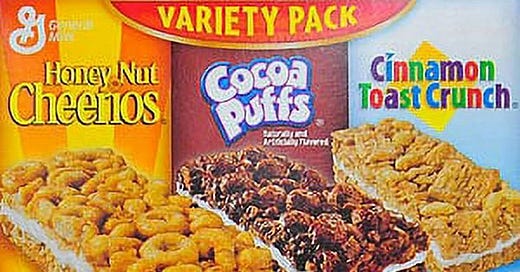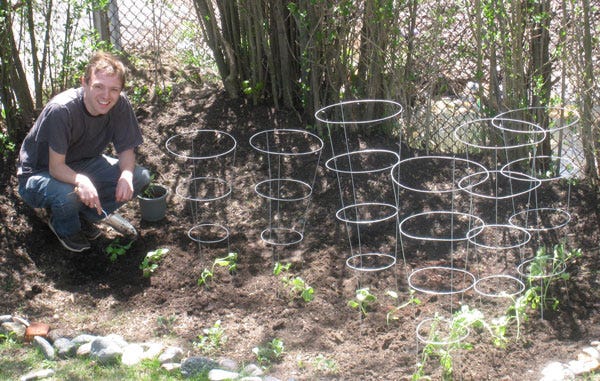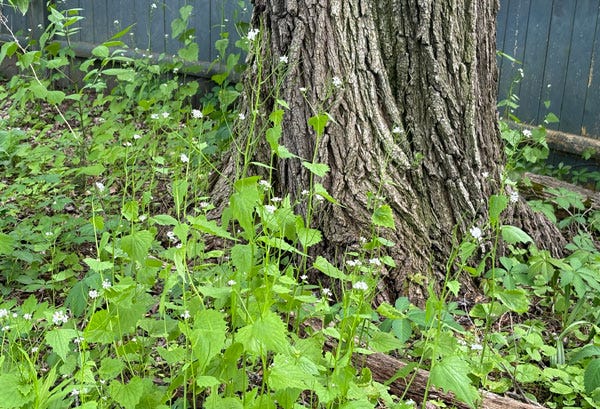Food is Indoctrination
We give so little thought to the food we eat, and maybe that's by design
Welcome to another edition of Willoughby Hills!
This newsletter explores topics like history, culture, work, urbanism, transportation, travel, agriculture, self-sufficiency, and more.
When I was young, my mother and my grandfather (who lived down the street from us) were both gardeners. My mom always grew a few tomato plants each season, while my grandpa used to devote a section of his backyard to growing tomato, squash, cucumber, and more. My grandma would can and save a lot of his crops so they could be enjoyed throughout the year.
Even with access to homegrown food like this, I was a picky eater and turned my nose up at what came from our backyard.
So what did I prefer instead? Processed foods. The more processed, the better. If there was a cartoon character on the box, I was on board. If the restaurant meal came with a toy, I wanted it. I hated when my mom cooked dinner and tried to convince her to take us to TGI Friday’s whenever possible (sometimes it worked).
When I was in middle school and we were allowed to pick out our own lunches in the cafeteria, I would usually use the money that I was given to buy spaghetti and meatballs to purchase Sour Patch Kids candy and french fries. We even had a self-serve Slushie machine that eventually went away because there was no limit set for how many pumps of flavored sugar syrup we could add to the top of the ice. Needless to say, us middle school boys were all adding 15-20 pumps of flavor (and sugar) to our drinks completely unsupervised. It was gross in hindsight, but oh so good in the moment.
As a high schooler, I was very excited when General Mills announced Milk N Cereal Bars, a snack bar meant to mimic the experience of eating a bowl of cereal with milk. According to a 2001 article from Supermarket News:
“The bars come in three flavors and are said to provide ‘The nutrition of a bowl of cereal with milk in a single bar’ as an on-the-go solution to breakfast.”
I used to think who needs real milk from a cow when science can save us from all that mess?
When I did eat fresh food, I had a distinct hierarchy of what I enjoyed.
To my mind, supermarket produce was my first choice. I saw the cleanliness and uniformity of it as it sat under fluorescent lights and was occasionally sprayed by misting machines as desirable. My second choice would be the farmers markets or farm stands that we would occasionally visit in Northeast Ohio, but even that started to feel suspect to me. Garden food from my own yard was my absolute last resort. How could I trust my parents or grandparents to feed me when they had none of the John Deere tractors or chemical pesticides and fertilizers that “real” farmers had?
For most of my early years, well into my mid-twenties, I didn’t understand much about food production, nutrition, or even capitalism. I never connected the dots that the bad food that I was eating and the supermarket produce I was consuming was not designed to nourish me or make me healthy. It was designed to line the pockets of corporations.
I’ve been thinking about this idea a lot recently: how capitalism has warped our sense of what counts as food. How big budget marketing campaigns convince us that sugary cereals, HFCS-laden sodas, and salty chips can be a part of a healthy diet just as much as milk, eggs, and vegetables.
But what is food, really?
It’s easy to forget in our modern world, but humans survived quite well for thousands and thousands of years without intervention from Kellogg’s, Pepsi, Nestle, or any of the other large food conglomerates.
In fact, food is all around us. We’ve just been taught that the only place to find it is a grocery store or fast food place, rather than our own backyards.
After I got over my aversion to eating garden grown foods, I decided to try my own hand at gardening. In our urban apartment’s small yard, my then-girlfriend (now wife) and I planted some small tomato and pepper plants, plus some lettuce and other greens.
I had some minor success as a gardener, but I didn’t have the skill or time to keep up with that hobby as I’d hoped and now opt to purchase produce from small organic farms near me. But even absent a formal garden these days, a walk around my yard revealed that “food” is everywhere!
Of course there are the mature sugar maples that have produced maple syrup for us for the last three or four years. I didn’t plant them and I didn’t tap them for most of my time in this house, but they have always been there ready to provide food.
As I wrote about earlier this month, there are morels that tend to come up during rainier spring seasons.
At the moment, our yard is covered in garlic mustard. It’s technically an invasive weed, but it’s also highly edible. (I made a video for paid subscribers last year that shows how to make pesto with it).
This is a small sampling of some of the plants that are growing in my yard which I did not plant and have done no work to cultivate. There are also protein sources in my yard too: rabbits, squirrels, ducks, deer, and even beaver.
Literally, all of this food is just within the bounds of my property, which is under an acre. Imagine how much food is within a half mile radius or a two mile radius, if I know what I’m looking for.
Part of the problem is I wouldn’t know what to look for. Very few of us do. We no longer see our health as connected to the land, as a part of nature.
We have bought into a system (whether by convenience, lack of knowledge, or both) that tells us that our meats should come from giant “operations” in places like Iowa (pork) or Kansas (beef), that our produce should come from California or Mexico, and that the most nutritious foods are developed in a lab, not healthy soil.
When we outsource our food production, we are letting big corporations, capitalism, determine how our land gets used, and indeed, how healthy our bodies are.
With predictable results.
After all, industry cares only about making money. It does not care about our land or our health. (In fact, if you look at Big Pharma, the medical industry, and the insurance industry, you could argue that sickness is better for business. Dr. Steven Gundry made this assertion when he was on my podcast, and that idea has stuck with me).
It’s high time that we redefine our relationship to nature and our relationship to food. Rethinking food may also cause us to rethink our relationships to entire systems of control and power, at least that’s how it worked for me.
I heard this idea echoed in the most recent episode of Abolition, Liberation, Solidarity, a podcast that I produce for
. Here’s what Naley, a filmmaker and writer whose work focuses on oppressed populations around the world, told host and executive producer about radical thinking (quote slightly condensed here):“I wonder, are we prepared as a group of people to radically change, right? Like to actually have change, we need to be radical in our change. And the word radical has such a negative connotation in the West because we always associate it to extremism.
But in actuality, the word radical itself comes from the Latin word radix, which really translates to root, literally to root, to source. So the more radical we become, we're just returning back to who it is we are. The more radical we become, we're coming back to the root of who we are, which is nature. It is actually quite beautiful.
We cannot talk about free Palestine and then support all these huge companies, you know, give them all our money.
But then how are we shopping? Are we buying Tide? Are we buying Starbucks? How are we living? What are we eating? Are we growing our own food? Do we know what's going in our food?
And it's like, I think the beginning steps is to actually have these radical thoughts. that then allow you to have radical change. But we cannot inch forward to actual liberation if we do not begin to put ourselves in a radical mindset.”
For most of human history, food was local, seasonal, and vital.
If we allow ourselves to radically rethink our relationship to seemingly small things like the food we eat, it may get us to rethink bigger issues around fairness, equality, our military industrial complex, and more.
It’s a re-examination that I think is long overdue.
I’ve been writing about food and health for a while. If you’re feeling inspired by reading this post and want to take action, take a look at this article from 2022 where I offer some practical first steps to undoing the indoctrination of corporate food and eating better.
Thanks for reading Willoughby Hills! Subscribe for free to receive new posts and support my work.
Related Reading
A Diet That Works! (*at least for me)
If you’ve missed past issues of this newsletter, they are available to read here.








Always cracks me up when people deride agricultural areas such as midwestern US, SK & MB Canadian provinces. Those places are mocked and people claim there's nothing there. My rebuttal is always it's our food supply. Crop science involves the same mathematics and analytics as other private- and public-sector pursuits.